Boxing, like most ancient practices, is littered with myths that have stood the test of time. A closer examination into some of these beliefs renders them mere fallacies. One of those notions is that a majority of the best boxing trainers have fought in the professional ranks. It wouldn’t be inconceivable to believe that trainers have had first-hand experience of making their living by trading leather under the bright lights. Surely this grounding would make someone best placed to teach professional fighters the secrets of the ancient art of boxing?
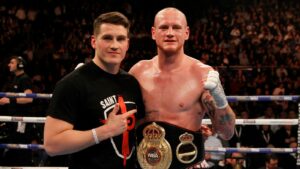
That’s nothing but guesswork. In fact, what we are seeing is quite the opposite in British boxing. Most of Britain’s best fighters, actually 12 out of the top 20 of BoxRec’s British pound-for-pound list fighters (at the time of writing), don’t have a trainer that has previously fought at a professional level. These include former Olympians like; Luke Campbell, Billy Joe Saunders, Amir Khan and other well-schooled amateurs, such as; Josh Taylor, Callum Smith and Tyson Fury. Given their tens of thousands of hours in the ring, why would they trust their guidance to someone who hasn’t boxed professionally in the past?
This isn’t a new phenomenon by any stretch of the imagination. The rich tapestry of boxing’s history is littered with Hall of Fame trainers who haven’t laced up gloves in the professional ranks. Just to name a few; Cus D’Amato, Ray Arcel, Emanuel Steward, Angelo Dundee and Teddy Atlas. Not a bad cohort, I’m sure you’d agree.
Former two-time Southern Area Champion and current professional boxing trainer, Gary Logan, explains why so many of the legendary boxing trainers were successful, despite lack of professional boxing grounding: “What’s the common denominator? These [the names listed above] are all highly intelligent men. If you are highly intelligent, have a passion and you love boxing, and you are able to get your points across, then the chances are that your fighter will benefit from it.”
During Gary Logan’s professional career he amassed a 33-8-1 record. Since retiring from boxing he has made a name in his own right and now guides a handful of prospects. Perhaps he is best known for training the likes of David Haye, George Groves and Andy Lee alongside Adam Booth – a man that is regarded as one of Britain’s best trainers over the past decade – who also, coincidentally, hasn’t fought professionally.
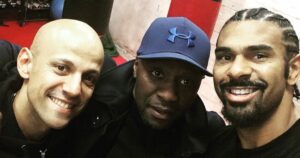
Logan doesn’t rule out potential benefits of having a professional career, by pointing out that in the absence of experience and recognition as a professional boxing trainer, a successful professional career can help entice fighters to work with an aspiring trainer. Professional boxing trainer and former amateur boxer, Don Charles, added: “There are some fighters, who would say that they rather work with someone that has boxed [as a] pro.”
Last year when Cruiserweight prospect, Isaac Chamberlain, announced that he would be working with a relative newcomer to the British boxing scene, Spaniard Angel Fernandez, it left most bystanders surprised – as Fernandez wasn’t a household name at the time and isn’t the owner of a lofty resume in the professional ranks. The Sutton based trainer, Fernandez, points out that despite these factors he was able to build an instantaneous rapport with Chamberlain and they were destined to work together, stating that: “Isaac [Chamberlain], he could have went to work with anyone, but he chose me as we made an instant connection. That’s more important than whether someone has boxed as a professional before.”
The Spanish coach acknowledges that the trend of having successful head trainers that haven’t operated at the highest echelons in their respective sports isn’t only something that we are seeing in boxing – using football management as an example. He points out that all-time greats in many sports aren’t able to transition that on-field execution into teaching others: “You don’t need to be a good pro boxer to become a good trainer, the same applies in every other sport. Look at [Diego] Maradona, who was an unbelievable footballer, but not that good as a coach. There’s these type of guys across all types of sports.”
London-based trainer of some of our best domestic heavyweights, Don Charles, echoes the views of his peer: “A lot of people [former fighters] that are at the top level of boxing, in my observations [in boxing], they don’t generally make good coaches as they’ve been in wars. And they don’t have the patience and temperament to guide somebody.”
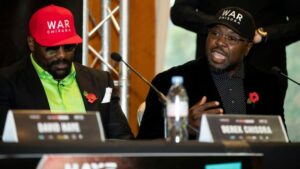
Charles, known primarily for his time together with Dereck Chisora, points out the over emphasis on the word ‘professional’ in boxing circles, “When we dissect the word professional it means that you do it for a living. It doesn’t mean that you are good at it”, adding that in every trade and industry you get people both effective and ineffective at their jobs, whilst they are still considered as professionals. He goes onto highlight that there’s a lot of former professional boxers, who weren’t successful at the World stage that are now guiding fighters. Some of course doing this more successfully than others.
Angel Fernandez believes that not having a professional career has made him think outside of the box, “Sometimes not having been coached in one way all your life [by one long-time trainer] means that you are more open to trying different things”, pointing out that his thirst for knowledge extends beyond the sweet science, “I always look to learn from all elite coaches, for example I watch what Pep Guardiola does and look to learn from that. I am always looking to adapt and try different things.”
It’s hard to entirely discount the merits that being a boxer could offer to a young trainer, whether it be a professional network or even just name recognition. Trainer, Gary Logan, basing himself out of the BXR gym in London, was in a privileged position to learn from one of the old masters as a result of being a professional boxer. He fought as chief support on the undercard of Mike McCallum versus Glenn Thomas, which gave him a chance to observe the late, great Eddie Futch. Talking about how that influenced him, he explained: “A lot of my teachings are heavily influenced by Carlie Carew [his long term trainer] – in the manner that I teach it is probably more than Eddie Futch. Nobody had more influence on me than me watching Eddie Futch.”
Adam Booth’s former right-hand man, Logan, said that the suggestive manner in which Futch was able to convince his fighters to follow his instructions. Adding that his in-ring experience have also helped him guide his current crop of talented fighters (Deion Jumah, Dean Richardson and Sammy McNess), by making the point: “I had 42 pro fights, it would be stupid of me not to impart what I’ve learned. I was 33-8-1, so I’ve had to come back from losses. I’ve had good wins and bad wins, having to learn from them all. It helps me to prepare them for every eventuality.”
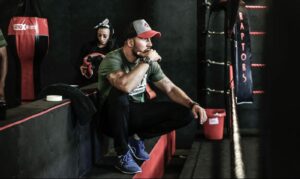
The cross-pollination of ideas and apprenticeships are usually a great way to groom the next generation of talent, why would boxing be different? Most great trainers have worked under the tutelage of others – Emmanuel Steward and Freddie Roach are both protégés of Eddie Futch. Teddy Atlas is a protégé of Cus D’Amato, and the list goes on.
Former amateur boxer, Angel Fernandez, is no different. He spent time learning in close quarters from two Hall of Fame Cuban coaches in Jorge Rubio and Ismael Salas before embarking on his own journey. Fernandez believes that sharing learnings between coaches and fighters works in both ways, “Jorge [Rubio] is like a father figure to me and one of the greatest trainers in boxing. But he will learn from me about different things,” adding, “There’s so much that I’ve learned from him. It works both ways, great trainers take on board things that they’ve learned from other coaches.”
Fernandez’ belief is that coaches can also learn from fighters, such is his relationship with his Kazakh fighter and former World Amateur Championship silver medalist, Sultan Zaurbek. The trainer explains: “I’ve learned from Sultan about the Kazakh amateur system [training methods], which means that I can take what I like from his experiences, adapt them and leave the bits behind that I don’t like.”
The evidence isn’t stacking up to suggest that a professional boxing grounding adds a distinctive advantage to a trainer’s repertoire, is it? Logan put it very plainly: “What we are seeing is all these top fighters that have pro coaches that don’t have pro experience. It doesn’t really hold the argument that you need to have boxed professionally to be a pro coach.”
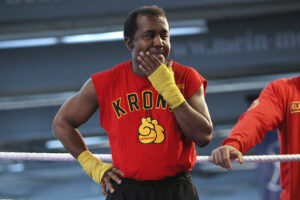
Merely discounting a professional career as not being advantageous when training fighters would be too simplistic. However, it seems quite evident that teaching boxing is a different game to being punched in the face, as Don Charles put it: “Teaching is an art, not everyone can be a teacher, and they might have the knowledge because they’ve been in there or might have the experience of fighting. The experience of fighting and teaching are two different experiences.”
The traits and characteristics of a ‘good’ boxing coach don’t have to have been displayed by fighters, in order to complete the transition. Some overlap does exist – good fighters and coaches are both great listeners. However, most people wouldn’t necessarily say that pugilists need to be blessed with patience – rather than punching power.
I suspect that in the not so distant future, once again a successful trainer like Shane McGuigan will be belittled and called a ‘PE teacher’ by a former professional fighter. Boxing is no different to any other ancient art, despite the evidence stacking up, sadly old myths are hard to eradicate.
Article by: Riku Heikkilä
Follow Riku on Twitter at: @Lead_Right